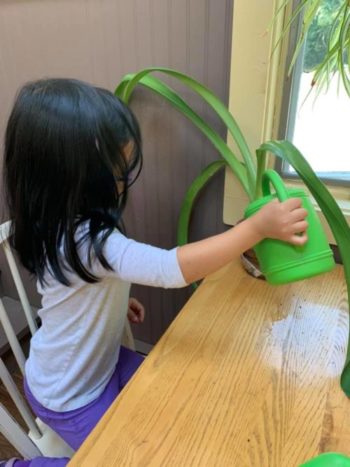
Why Have Indoor Plants In Your Learning Environment?
Having live plants indoors is linked with improved concentration and memory, while many also cleanse the air and increase oxygen levels. What does this mean for learners being educated in classrooms with live plants? They experience higher levels of productivity and lower levels of mental fatigue and overall stress. The Attention Restoration Theory
suggests that nature, and natural environments are restorative to human brains.
Not only do plants increase oxygen levels, but also improve air quality by humidifying the air through their photosynthesis process. NASA’s study on indoor plants and clean air shows that certain plants even remove toxins from the air!

Another aspect worth considering is the responsibility and connection children gain from having and caring for live plants in their classroom. Having children help water, re-pot, trim dead leaves and flowers, and otherwise care for the plants helps them gain a more intimate understanding of what it takes to grow and nurture something living. This sense of responsibility and understanding of life’s fragility gives them a greater connection to their natural world outside of their classroom walls, as well. Having live plants in your classroom gives you a unique hands-on opportunity to teach your learners about plant biology. Some will produce pups or baby plants that can be removed and grown into new plants. Propagation in glass test tubes or jars to watch root growth is a fun process as well.
Not to be ignored is the aesthetic value that live plants bring to an environment. The environments where we work and play are essential to the way that we feel, think, and act. Abraham Maslow had a theory regarding a hierarchy of needs. Number six of these eight needs, was the need for aesthetics/beauty. According to his theory, ‘humans need to refresh themselves in the presence and beauty of nature while carefully absorbing and observing their surroundings to extract the beauty that the world has to offer. This need is a higher level need to relate in a beautiful way with the environment and leads to the beautiful feeling of intimacy with nature and everything beautiful.’ (Maslow)
There are no limits to the emotional, physiological, and aesthetic benefits to keeping live plants in your classroom. For ideas on the best kinds of plants to keep, take a closer look at the infographic detailing the plants NASA recommends for air purification. Please keep in mind some plants are poisonous to children and animals so be sure to research the plants you put in your learning space and be sure to keep potentially toxic plants out of reach of curious children or class pets!

